美式英语
英式英语和美式英语的差异

3词汇 1完全异义 例如:public school 在美国指公立学校,但在英式英语却是指私立学校。再如cupboard在英式英语是指壁橱,而在美国英语中则指厨房或吃饭间的食橱。 2同义异词 英语与美语对比如下:打电话ring/call;钞票note/bill;电影film/movie;足球football/soccer,汽油petrol/gas,地铁underground/subway,罐头fin/can,股票shares/stock,货摊stands/booth等。
单击此处可添加副标题
语言是客观世界的真实写照,是一种社会现象。人们生活、劳动在一种什么样的环境中,就会产生什么样的语言。一定的文化实体总是存在于一定的地域空间内, 不可避免地体现了该地域的自然面貌特点。由于美国和英国在地理环境、社会生活及风俗习惯方面仍有某些差异,美国中的某些词在英国中就不存在。美国国土幅员辽阔,地形变化万千。例如,caribou(北美的驯鹿),英国四面环海,岛国人的生活与海洋和水运事业有着密切的关系。对海洋的依赖与发展决定了航海民族务必使用大量与海有关的语汇,如 plain sailing (一帆风顺),go with the stream (随波逐流),on the rocks (触礁), 等。英国西临大西洋,东面欧洲大陆。欧洲大陆北部袭来的东风寒冷刺骨,大西洋徐徐吹来的西风则温暖宜人,因此才有桂冠诗人曼斯菲尔德的“It’s a warm wind, the west wind, full of bird crying.” 而反过来说,英国英语中的某些词在美国英语中也找不到,如prince (王子), duke(公爵),marquis(侯爵),knight(骑士)等词都是英国英语所特有的。
英式英语与美式英语差异
英式英语与美式英语差异的表现 虽然美式英语是从英式英语演变而来的,但是由于两者之间的历史、文化、经济发展的不同,从而导致英式英语与美式英语之间的差异,主要的差异表现如下:
美式英语和英式英语的区别
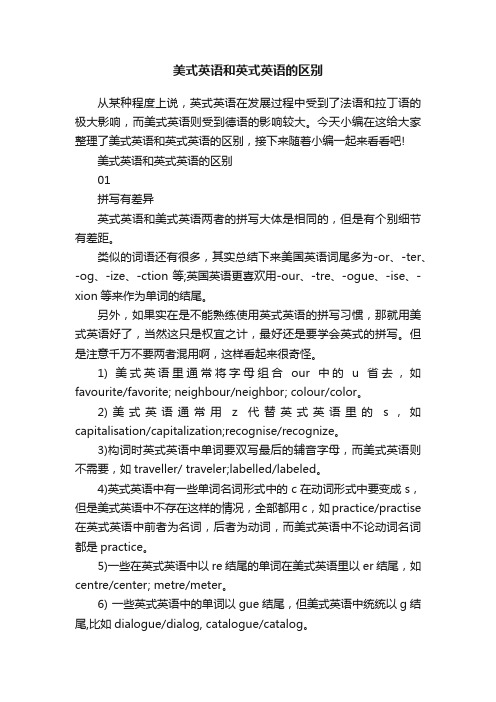
美式英语和英式英语的区别从某种程度上说,英式英语在发展过程中受到了法语和拉丁语的极大影响,而美式英语则受到德语的影响较大。
今天小编在这给大家整理了美式英语和英式英语的区别,接下来随着小编一起来看看吧!美式英语和英式英语的区别01拼写有差异英式英语和美式英语两者的拼写大体是相同的,但是有个别细节有差距。
类似的词语还有很多,其实总结下来美国英语词尾多为-or、-ter、-og、-ize、-ction等;英国英语更喜欢用-our、-tre、-ogue、-ise、-xion等来作为单词的结尾。
另外,如果实在是不能熟练使用英式英语的拼写习惯,那就用美式英语好了,当然这只是权宜之计,最好还是要学会英式的拼写。
但是注意千万不要两者混用啊,这样看起来很奇怪。
1) 美式英语里通常将字母组合our中的u省去,如favourite/favorite; neighbour/neighbor; colour/color。
2)美式英语通常用z代替英式英语里的s,如capitalisation/capitalization;recognise/recognize。
3)构词时英式英语中单词要双写最后的辅音字母,而美式英语则不需要,如traveller/ traveler;labelled/labeled。
4)英式英语中有一些单词名词形式中的c在动词形式中要变成s,但是美式英语中不存在这样的情况,全部都用c,如practice/practise 在英式英语中前者为名词,后者为动词,而美式英语中不论动词名词都是practice。
5)一些在英式英语中以re结尾的单词在美式英语里以er结尾,如centre/center; metre/meter。
6) 一些英式英语中的单词以gue结尾,但美式英语中统统以g结尾,比如dialogue/dialog, catalogue/catalog。
02用词有区别在词汇的使用上,最能够表现出来英式和美式英语的差异。
美式英语100句
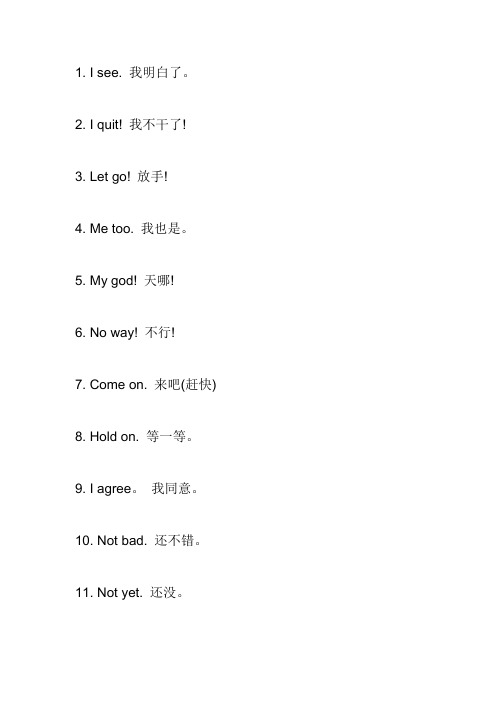
1. I see. 我明白了。
2. I quit! 我不干了!3. Let go! 放手!4. Me too. 我也是。
5. My god! 天哪!6. No way! 不行!7. Come on. 来吧(赶快)8. Hold on. 等一等。
9. I agree。
我同意。
10. Not bad. 还不错。
11. Not yet. 还没。
12. See you. 再见。
13. Shut up! 闭嘴!14. So long. 再见。
15. Why not? 好呀! (为什么不呢?)16. Allow me. 让我来。
17. Be quiet! 安静点!18. Cheer up! 振作起来!19. Good job! 做得好!20. Have fun! 玩得开心!21. How much? 多少钱?22. I'm full. 我饱了。
23. I'm home. 我回来了。
24. I'm lost. 我迷路了。
25. My treat. 我请客。
26. So do I. 我也一样。
27. This way。
这边请。
28. After you. 您先。
29. Bleyou! 祝福你!30. Follow me. 跟我来。
31. Forget it! 休想! (算了!)32. Good luck! 祝好运!33. I decline! 我拒绝!34. I promise. 我保证。
35. Of course! 当然了!36. Slow down! 慢点!37. Take care! 保重!38. They hurt. (伤口)疼。
39. Try again. 再试试。
40. Watch out! 当心。
41. What's up? 有什么事吗?42. Be careful! 注意!43. Bottoms up! 干盻(见底)!44. Don't move! 不许动!45. Guewhat? 猜猜看?46. I doubt it 我怀疑。
英式英语和美式英语的区别
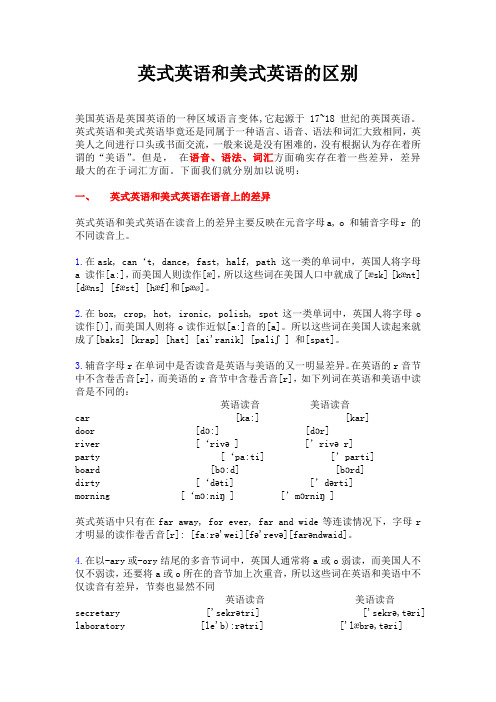
英式英语和美式英语的区别美国英语是英国英语的一种区域语言变体,它起源于17~18世纪的英国英语。
英式英语和美式英语毕竟还是同属于一种语言、语音、语法和词汇大致相同,英美人之间进行口头或书面交流,一般来说是没有困难的,没有根据认为存在着所谓的“美语”。
但是,在语音、语法、词汇方面确实存在着一些差异,差异最大的在于词汇方面。
下面我们就分别加以说明:一、英式英语和美式英语在语音上的差异英式英语和美式英语在读音上的差异主要反映在元音字母a, o 和辅音字母r 的不同读音上。
1.在ask, can‘t, dance, fast, half, path 这一类的单词中,英国人将字母a 读作[a:],而美国人则读作[æ],所以这些词在美国人口中就成了[æsk] [kænt] [dæns] [fæst] [hæf]和[pæø]。
2.在box, crop, hot, ironic, polish, spot这一类单词中,英国人将字母o 读作[)],而美国人则将o读作近似[a:]音的[a]。
所以这些词在美国人读起来就成了[baks] [krap] [hat] [ai'ranik] [paliʃ ] 和[spat]。
3.辅音字母r在单词中是否读音是英语与美语的又一明显差异。
在英语的r音节中不含卷舌音[r],而美语的r音节中含卷舌音[r],如下列词在英语和美语中读音是不同的:英语读音美语读音car [ka:] [kar]door [dɔ:] [dɔr]river [‘rivə ] [’rivə r]party [‘pa:ti] [’parti]board [bɔ:d] [bɔrd]dirty [‘dəti] [’dərti]morning [‘mɔ:niŋ ] [’mɔrniŋ ]英式英语中只有在far away, for ever, far and wide等连读情况下,字母r 才明显的读作卷舌音[r]: [fa:rə'wei][fə'revə][farəndwaid]。
美式英语与英式英语的区别
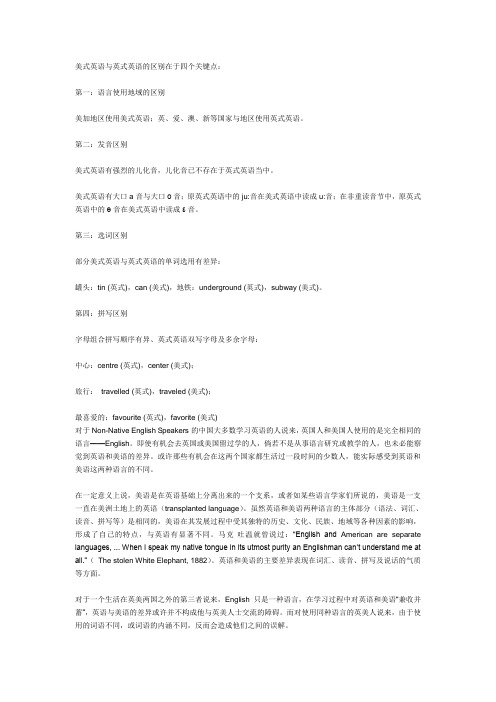
美式英语与英式英语的区别在于四个关键点:第一:语言使用地域的区别美加地区使用美式英语;英、爱、澳、新等国家与地区使用英式英语。
第二:发音区别美式英语有强烈的儿化音,儿化音已不存在于英式英语当中。
美式英语有大口a音与大口ο音;原英式英语中的ju:音在美式英语中读成u:音;在非重读音节中,原英式英语中的ə音在美式英语中读成ε音。
第三:选词区别部分美式英语与英式英语的单词选用有差异:罐头:tin (英式),can (美式),地铁:underground (英式),subway (美式)。
第四:拼写区别字母组合拼写顺序有异、英式英语双写字母及多余字母:中心:centre (英式),center (美式);旅行:travelled (英式),traveled (美式);最喜爱的:favourite (英式),favorite (美式)对于Non-Native English Speakers的中国大多数学习英语的人说来,英国人和美国人使用的是完全相同的语言——English。
即使有机会去英国或美国留过学的人,倘若不是从事语言研究或教学的人,也未必能察觉到英语和美语的差异。
或许那些有机会在这两个国家都生活过一段时间的少数人,能实际感受到英语和美语这两种语言的不同。
在一定意义上说,美语是在英语基础上分离出来的一个支系,或者如某些语言学家们所说的,美语是一支一直在美洲土地上的英语(transplanted language)。
虽然英语和美语两种语言的主体部分(语法、词汇、读音、拼写等)是相同的,美语在其发展过程中受其独特的历史、文化、民族、地域等各种因素的影响,形成了自己的特点,与英语有显著不同。
马克·吐温就曾说过:“English and American are separate languages, ... When I speak my native tongue in its utmost purity an Englishman can’t understand me at all.”(The stolen White Elephant, 1882)。
美式英语和英式英语2篇
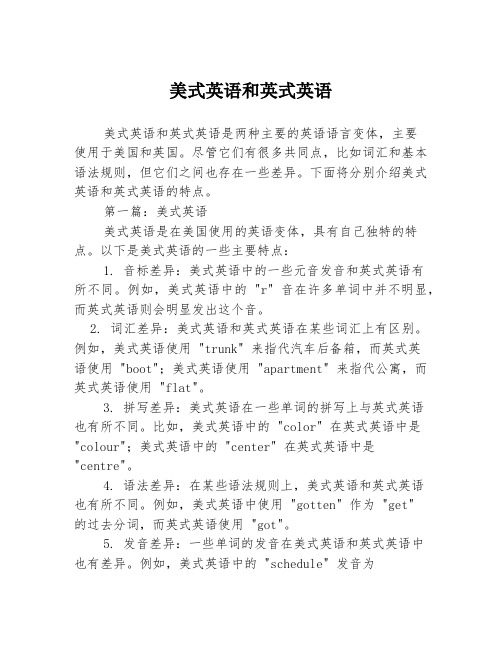
美式英语和英式英语美式英语和英式英语是两种主要的英语语言变体,主要使用于美国和英国。
尽管它们有很多共同点,比如词汇和基本语法规则,但它们之间也存在一些差异。
下面将分别介绍美式英语和英式英语的特点。
第一篇:美式英语美式英语是在美国使用的英语变体,具有自己独特的特点。
以下是美式英语的一些主要特点:1. 音标差异:美式英语中的一些元音发音和英式英语有所不同。
例如,美式英语中的 "r" 音在许多单词中并不明显,而英式英语则会明显发出这个音。
2. 词汇差异:美式英语和英式英语在某些词汇上有区别。
例如,美式英语使用 "trunk" 来指代汽车后备箱,而英式英语使用 "boot";美式英语使用 "apartment" 来指代公寓,而英式英语使用 "flat"。
3. 拼写差异:美式英语在一些单词的拼写上与英式英语也有所不同。
比如,美式英语中的 "color" 在英式英语中是"colour";美式英语中的 "center" 在英式英语中是"centre"。
4. 语法差异:在某些语法规则上,美式英语和英式英语也有所不同。
例如,美式英语中使用 "gotten" 作为 "get"的过去分词,而英式英语使用 "got"。
5. 发音差异:一些单词的发音在美式英语和英式英语中也有差异。
例如,美式英语中的 "schedule" 发音为/ˈskɛdʒul/,而英式英语中发音为 /ˈʃɛdjuːl/。
总的来说,美式英语通常更为直接、简洁,注重实用性和实际运用。
它在全球范围内广泛被使用,并且受到了电影、音乐和大众文化的较大影响。
第二篇:英式英语英式英语是在英国使用的英语变体,它也具有自己的独特特点。
英式英语与美式英语的区别
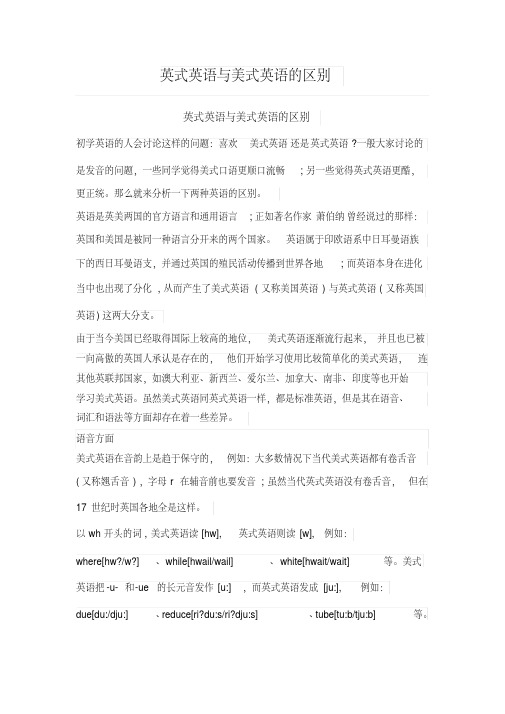
英式英语与美式英语的区别英式英语与美式英语的区别初学英语的人会讨论这样的问题:喜欢美式英语还是英式英语?一般大家讨论的是发音的问题,一些同学觉得美式口语更顺口流畅;另一些觉得英式英语更酷,更正统。
那么就来分析一下两种英语的区别。
英语是英美两国的官方语言和通用语言;正如著名作家萧伯纳曾经说过的那样:英国和美国是被同一种语言分开来的两个国家。
英语属于印欧语系中日耳曼语族下的西日耳曼语支,并通过英国的殖民活动传播到世界各地;而英语本身在进化当中也出现了分化,从而产生了美式英语(又称美国英语)与英式英语(又称英国英语)这两大分支。
由于当今美国已经取得国际上较高的地位,美式英语逐渐流行起来,并且也已被一向高傲的英国人承认是存在的,他们开始学习使用比较简单化的美式英语,连其他英联邦国家,如澳大利亚、新西兰、爱尔兰、加拿大、南非、印度等也开始学习美式英语。
虽然美式英语同英式英语一样,都是标准英语,但是其在语音、词汇和语法等方面却存在着一些差异。
语音方面美式英语在音韵上是趋于保守的,例如:大多数情况下当代美式英语都有卷舌音(又称翘舌音),字母r在辅音前也要发音;虽然当代英式英语没有卷舌音,但在17世纪时英国各地全是这样。
以wh开头的词,美式英语读[hw], 英式英语则读[w],例如:where[hw?/w?]、while[hwail/wail]、white[hwait/wait]等。
美式英语把-u-和-ue的长元音发作[u:],而英式英语发成[ju:],例如:due[du:/dju:]、reduce[ri?du:s/ri?dju:s]、tube[tu:b/tju:b]等。
美式英语把-a-读成[?],而英式英语读成[a或a:],例如:craft[kr?ft/kraft]、half[h?f/ha:f]、laugh[l?f/la:f]等。
美式英语和英式英语的读音差异还表现在某些单词的发音上,没有一定的规律可循,例如:ate[eit/et]、been[bin/bi:n]、idyll[ˊaidl/ˊidil]等。
美式英语与英式英语的区别
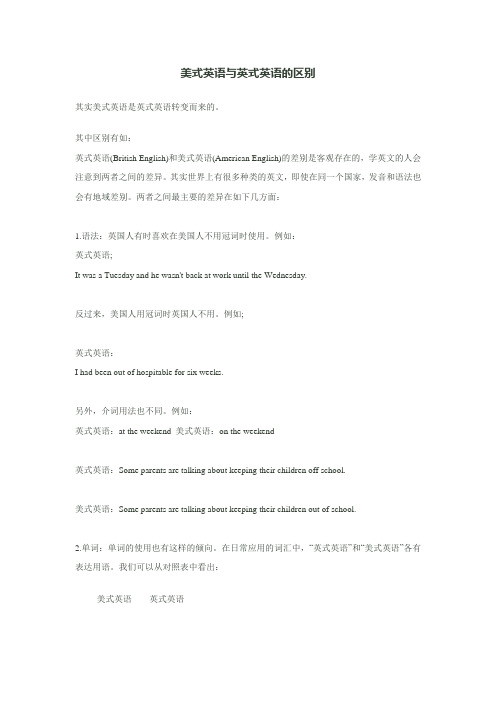
美式英语与英式英语的区别其实美式英语是英式英语转变而来的。
其中区别有如:英式英语(British English)和美式英语(American English)的差别是客观存在的,学英文的人会注意到两者之间的差异。
其实世界上有很多种类的英文,即使在同一个国家,发音和语法也会有地域差别。
两者之间最主要的差异在如下几方面:1.语法:英国人有时喜欢在美国人不用冠词时使用。
例如:英式英语;It was a Tuesday and he wasn't back at work until the Wednesday.反过来,美国人用冠词时英国人不用。
例如;英式英语:I had been out of hospitable for six weeks.另外,介词用法也不同。
例如:英式英语:at the weekend 美式英语:on the weekend英式英语:Some parents are talking about keeping their children off school.美式英语:Some parents are talking about keeping their children out of school.2.单词:单词的使用也有这样的倾向。
在日常应用的词汇中,“英式英语”和“美式英语”各有表达用语。
我们可以从对照表中看出:美式英语英式英语高速公路freeway motorway电梯elevator lift饼干cookie biscuit雨伞umbrella brollie汽油gas gasoline, petrol汽车automobile car大学校长president chancellor足球soccer football假期vacation holiday3.拼写:英式英语和美式英语在拼写方面也有差别。
美式英语英式英语color colourfavorite favouritehonor honour4.发音的差异也很大。
- 1、下载文档前请自行甄别文档内容的完整性,平台不提供额外的编辑、内容补充、找答案等附加服务。
- 2、"仅部分预览"的文档,不可在线预览部分如存在完整性等问题,可反馈申请退款(可完整预览的文档不适用该条件!)。
- 3、如文档侵犯您的权益,请联系客服反馈,我们会尽快为您处理(人工客服工作时间:9:00-18:30)。
liked the organ and the piano, in the church.Not any early music was church music. Some people likedto drink and dance. Many drink places opened with fiddle(violin) music and European songs entertained the people.American farmer soon left the east coast to begin newfarms further west. The farms were big and far depart. Therewere not many towns or churches. Religious leaders, they calledpreachers, rided horses around the country and brought religionto the farm people.To bring the country people together in large group, thesepreachers held the “camp meetings”. These religious meetingsheld in big tents. Sometimes thousands of people went to hearthe preachers. Camp meetings often went on several days.Popular religion songs were sung and the music was very lively. People clapped their hands and tapped their feet to the music. The first camp meeting was held in 1800 and they are still held today. Many pop stars, for example Elvis Presley, first learned to sing and to love music at these meetings.21____________22____________23____________24____________25____________26____________27____________28____________29____________30____________31____________32____________33____________34____________35____________36____________37____________38____________39____________40____________Section B: Cloze41 42 43 44 4546 47 48 49 5051 52 53 54 5556 57 58 59 60Score_____________ Marker____________III. Reading Comprehension61 62 63 64 6566 67 68 69 7071 72 73 74 7576 77 78 79 8081 82 83 84 85Score____________ Marker___________IV. TranslationSection A: Chinese-to-English (10%)______________________________________________________________ ______________________________________________________________ ______________________________________________________________ ______________________________________________________________ ______________________________________________________________ ______________________________________________________________ ______________________________________________________________ ______________________________________________________________ ______________________________________________________________ ______________________________________________________________ ______________________________________________________________ ______________________________________________________________ ______________________________________________________________ ______________________________________________________________ ______________________________________________________________ ______________________________________________________________ ______________________________________________________________Section B: English-to-Chinese (10%)______________________________________________________________ ______________________________________________________________ ______________________________________________________________ ______________________________________________________________ ______________________________________________________________ ______________________________________________________________ ______________________________________________________________ ______________________________________________________________ ______________________________________________________________ ______________________________________________________________ ______________________________________________________________ ______________________________________________________________ ______________________________________________________________ ______________________________________________________________ ______________________________________________________________ ______________________________________________________________ ______________________________________________________________Score____________Marker___________V. Writing______________________________________________________________ ______________________________________________________________ ______________________________________________________________ ______________________________________________________________ ______________________________________________________________ ______________________________________________________________ ______________________________________________________________ ______________________________________________________________ ______________________________________________________________ ______________________________________________________________ ______________________________________________________________ ______________________________________________________________ ______________________________________________________________ ______________________________________________________________ ______________________________________________________________ ______________________________________________________________ ______________________________________________________________ ______________________________________________________________ ______________________________________________________________ ______________________________________________________________ ______________________________________________________________ ______________________________________________________________ ______________________________________________________________ ______________________________________________________________ ______________________________________________________________ ______________________________________________________________ ______________________________________________________________ ______________________________________________________________ ______________________________________________________________ ______________________________________________________________ TAPESCRIPT OF LISTENING COMPREHENSION(woman) Graduation Proficiency TestFor Self-Taught Undergraduate StudentsGuangdong(Sample)(man) Part One: Listening ComprehensionIn this part of the test, you will hear two conversations and two monologues. Listen to them carefully and then answer the questions following them. For each question, four choices are given. Choose the best answer and mark your choice on the ANSWER SHEET. You have approximately 20 minutes to do this part. Stop writing when you hear the words End OF PART ONE.Now listen to the first conversation.(woman) Conversation One.You will hear a conversation between a man and a woman. Listen to it carefully and answer questions 1-5. Mark your answer on the ANSWER SHEET.(man) Ow! That hurts!(woman) What happened? Did you cut yourself?(man) Yes –on the edge of this paper. How can such a little cut hurt so much? I’m not even bleeding, but my finger really hurts.(woman) You know, I read something about that. It turns out that a little cut on a finger can hurt a lot more than a big cut somewhere else.(man) Why? That doesn’t make any sense.(woman) Actually, it does. There are more nerve endings in your hands than almost anywhere else in the body, and it’s the nerve endings that allow you to feel pain.(man) I guess that’s true.(woman) Also, a little cut like yours won’t damage the nerve endings, just irritate them. If they were damaged, you’d feel less pain, but the wound could be more serious.(man) So I suppose I should be happy my finger hurts so much, right?(woman) Right. Now go get yourself a bandage.(man) Why? You just told me it’s not serious.(woman) It’s not, but it does seem to be bothering you. Putting a bandage over the cut will keep the skin from drying and will help keep the skin together. If the skin stays together, the nerve endings won’t be exposed, and the cut will hurt less.(A 75-second interval)(woman) Now listen to the second conversation.Conversation Two.You will hear a conversation between a man and a woman. Listen to it carefully and answer questions 6-10. Mark your answer on the ANSWER SHEET.(man) Hi, Lynn, I saw you at registration yesterday. I sailed right through but you were standing in a long line.(woman) Yeah, I waited an hour to sign up for a distance-learning course.(man) Distance learning? Never heard of it.(woman) Well, it’s new this semester –it’s only open to psychology majors. But I bet it’ll catch on elsewhere. Yesterday over a hundred students signed up.(man) Well, what is it?(woman) It’s an experimental course. I registered for child psychology. All I’ve got to do is watch a twelve-week series of televised lessons. The department shows them several different times a day and in several different locations.(man) Don’t you ever have to meet with your professor?(woman) Yeah, after each part of the series I have to talk to her and the other students on the phone, you know, about our ideas. Then we’ll meet on campus three times for reviews and exams. (man) It sounds pretty nontraditional to me, but I guess it makes sense, considering how many students have jobs. It must really help with their schedules –not to mention how it’ll cut down on traffic.(woman) You know, last year my department did a survey and they found out that 80 percent of all psychology majors were employed. That’s why they came up with the program. Look, I’ll be working three days a week next semester, and it was either cut back on my classes or try this out.(man) The only thing is ... doesn’t it seem impersonal, though? I mean, I’d miss having class discussions and hearing what other people think.(woman) Well, I guess that’s why phone contact’s important. Anyway, it’s an experiment. Maybe I’ll end up hating it.(man) Maybe, but ... I’ll be curious to see how it works out.(A 75-second interval)(man) Now listen to the first monologue.Monologue One.You will hear a short talk. Listen to it carefully and answer questions 11-15. Mark your answer on the ANSWER SHEET.(woman)When I was in British Columbia last July working at the department’s archaeological dig, I saw the weirdest rainbow. At first I couldn’t believe my eyes because the bands of color I saw weren’t in a single half circle arc across the sky. Instead, I saw a full circle of rainbow hues hanging in the sky just above the sea. Inside the circle there was a big white disc and above the circle there was another round band of colors forming a halo. There were curved legs of multicolored light coming off the sides of the circles. It was an incredible sight.I ran back to our main camp and tried to get our cook to come with me to see my fantastic find before it disappeared. He just laughed at my excited story and told me that what I saw was nothing special... just some “sun dogs.”He said I’d be sure to see many more before I left. And sure enough, I did. When I got back from the dig I asked Professor Clark about the “sun dogs,”and she’s going to tell us more about them.(A 75-second interval)(woman) Now listen to the second monologue.Monologue Two.You will hear a short talk. Listen to it carefully and answer questions 16-20. Mark your answer on the ANSWER SHEET.(man)Today’s lecture will center on prehistoric people of the Nevada desert. Now, most of these prehistoric desert people moved across the countryside throughout the year. You might think that they were wandering aimlessly –far form it! They actually followed a series of carefully planned moves. Where they moved depended on where food was available –places where plants were ripening or fish were spawning.Now often when these people moved, they carried all their possessions on their backs, but if the journey was long, extra food and tools were sometimes stored in caves or beneath rocks. One of these caves is now an exciting archaeological site. Beyond its small opening is a huge underground grotto. Even though the cave’s very large, it was certainly too dark and dusty for the travelers to live in –but it was a great place to hide things, and tremendous amounts of food supplies and artifacts have been found there. The food includes dried fish, seeds, and nuts. The artifacts include stone spear points and knives; the spear points are actually rather small. Here’s a picture of some that were found. You can see their size in relation to the hands holding them.(A 75-second interval)(woman) This is the End OF PART ONE. Please go on to the other parts of theexam.Key to the SamplePart One (1 % each)1. D2. A3. D4. C5. B6. B7. A8. C9. D 10. B11.B 12. A 13. C 14. D 15. C16. D 17. A 18. B 19. C 20. APart TwoSection A (0.5 % each)Native Americans lived in America before Columbus arrived. They had songs for many occasions and they used drums and other musical instruments. Dancing and music was an important part of their life and their religion. You can still hear native American music and see dancing at special festivals.The first British people ^ came to America were very religious. They came for religious freedom. Their songs were simple and it did not use musical instruments in the church.Soon other people had different forms of the Christian religion arrived in America. They brought different kinds of church music from Europe and they used musical instruments, liked the organand the piano, in the church.Not any early music was church music. Some people liked to drink and dance. Many drink places opened and fiddle (violin) music and European songs entertained the people.American farmer soon left the east coast to begin new farms further west. The farms were big and far depart. There were not many towns or churches. Religious leaders, they called preachers, rided horses around the country and brought religion to the farm people.To bring the country people together in ^ large group, these preachers held the “camp meetings”. These religious meetings ^held in big tents. Sometimes thousands of people went to hear the preachers. Camp meetings often went on ^ several days. Popular religion songs were sung and the music was very lively. People clapped their hands and tapped their feet to the music. The first camp meting was held in 1800 and they are still held today. Many pop stars, for example Elvis Presley, first learned to sing and to love music at these meetings.21___who/that__22_____√______23_____they____24_____with____25_____√______26_____√______27____like_____28____all______29___drinking__30_entertaining__31___farmers___32___apart_____33___ they ____34____rode____35_____√______36_____a______37____the_____38____were____39____for_____40__religious___Section B (0.5 % each)41. a/ around 42. f/decision 43. p/handling 44. g/at 45. b/where46. y/clue 47. q/located 48. e/for 49. j/whether 50. t/now51. d/about 52. i/nice 53. s/from 54. u/confused 55. v/not56. w/especially 57. x/and 58. c/through 59. h/some 60. r/outPart Three (1% each)61. B 62. D 63. A 64. C 65.D66. B 67. B 68. A 69. C 70. A71. D 72. D 73. C 74. D 75. B76. A 77. D 78. A 79. B 80. A81. D 82. B 83. D 84. C 85. DPart FourSection A (10%)Recently the TV screen has been dominated by two major events in the news. One of them is the war on Iraq waged by US-British coalition forces, and the other is the outbreak of atypical pneumonia.With the coalition forces taking Baghdad, the battles have come to an end. But the troubles are far from over. Looting takes place everywhere. Water and power supply has not been resumed yet. There is a severe shortage of daily necessities. The Iraqi people do not like a foreign occupation army. They yearn for a government of their own.The first case of atypical pneumonia was reported in Foshan last November. Now the epidemic has spread to many countries and regions across the world and has claimed several hundred lives. Health workers are doing their best to fight this disease and have achieved considerable progress. It is hoped that, through international cooperation, they can soon check the spread of the disease, find an effective cure and develop a vaccine against it.Section B (10 %)人同时既是一个孤独的生物,又是一个社会性的生命。
